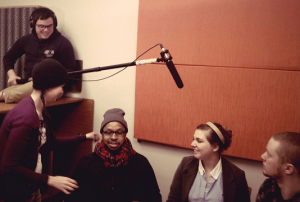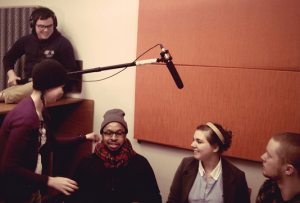
Last weekend, I spent some extra time in the Lincoln Park UCWbL making my big debut on the spotted office carpet; I did notice that it at least has some hints of red in it, so that made me feel like a bit of a celebrity.
The ‘Breakroom’ is the UCWbL Films-produced web series that explores real-world peer tutoring scenarios from a comical, self-deprecating perspective. Check out episodes 1 and 2on the UCWbL Youtube page if you haven’t seen them yet.
For episode three, The Genius, I had the opportunity to resurrect my high school acting experience while playing Julian Tramblay, a writer with inordinately high levels of confidence that make it difficult for him to receive peer feedback. UCWbLer Kevin K. plays Kenneth, the tutor who struggles to keep his temper under control as Julian refuses to consider any revisions of his essay. The episode is about Kenneth’s growth as a tutor as much as it is about Julian’s growth as a writer.
A major conflict in the episode exists between minimalist and directive tutoring, two approaches that Kenneth sees as being mutually exclusive. He considers himself a “minimalist tutor,” and is consequently unwilling to implement more directive strategies when necessary. Minimalism is usually described as a ‘hands-off’ approach, one that uses inquiry to help the writer look at his or her work more critically. In contrast, the directive approach places the tutor in a more active role to express a definitive opinion about the project and propose more specific revisions for the writer. Kenneth’s singular focus on minimalism causes problems during his first tutorial with Julian because the minimalist strategies he applies prevent him from expressing his honest opinion of the essay. Kenneth’s lack of confidence and assertiveness allow Julian to dominate the conversation, challenging every piece of feedback he is given. Only a few minutes into the appointment, Kenneth looks as if he’s about to snap, his lack of patience rendering the discussion unproductive.
Reflecting on this experience, Kenneth receives some helpful advice from fellow tutors ___ played by UCWbLers Micki B. and Robert W. They draw from Shamoon and Burns’ A Critique of Pure Tutoring, an academic essay that discusses the problems that arise when tutors automatically apply minimalist approaches in every conference. They emphasize the need for tutors to learn directive strategies because writing center clients display a wide variety of needs and learning methods, many of them being more receptive to tutors who take active roles when engaging with their drafts.
“…we find that crucial information about…writing is transmitted in ways that are intrusive, directive, and product-oriented, yet these behaviors are not perceived as an appropriation of power or voice but instead as an opening up of those aspects of practice which had remained unspoken and opaque.”
Among other examples of inspirations for directive methods, Shamoon and Burns point to the curriculum of music master classes as a potential influence on tutoring. Such classes focus as much on the expert’s approach to a piece of music as the student’s. The idea is that receiving authoritative guidance from a successful individual exposes the students to new ways of thinking about their own performance. While there are obvious differences between music and writing that need to be accounted for, directive tutoring works in a similar way.
For example, working on thesis development, an inquiry-based strategy can help the writer think critically about what the central claim or goal of the piece is. However, if that writer has difficulty understanding and practicing basic grammar rules, the tutor’s willingness to provide specific suggestions for word choice and sentence structure could be a major turning point in the conference. On the surface, such a strategy seems strictly “product-oriented,” yet if this use of modeling is necessary to concretize the writer’s understanding of a rule or convention, then who’s to say that the approach isn’t ‘writer-oriented’ as well? Combatting negative attitudes toward such product-oriented strategies is a major part of Shamoon of Burns’ essay, a goal that pits them against the widely-accepted minimalist perspective of Jeff Brooks. His emphasis on improving writers before the writing itself should certainly play a role in one’s tutoring philosophy, but a hands off approach is not likely to hold true in every appointment.
Thinking about these issues and playing the character of Julian helped me to reflect on my tutoring experiences. I have been employing a mix of minimalist and directive strategies over the past year and a half, but recently I’ve been more inclined to take directive approaches, particularly when working with ELA and SNL writers in the Loop Office.
Overall, the shoot was a very positive experience, the 1-hour Chipotle lunch break being the highlight of my Saturday. Keep an eye out for the new episode in the coming months; for those readers who don’t know me yet, I assure you that I don’t use phrases like ‘post haste’ and ‘heretofor unprecedented’ in real life.
Discover more from UCWbLing
Subscribe to get the latest posts sent to your email.


One reply on “Is minimalism the new black? The Breakroom has your answer”
Haha, I just now caught the reference to Kant in Shamoon & Burns’ piece. Coooool.